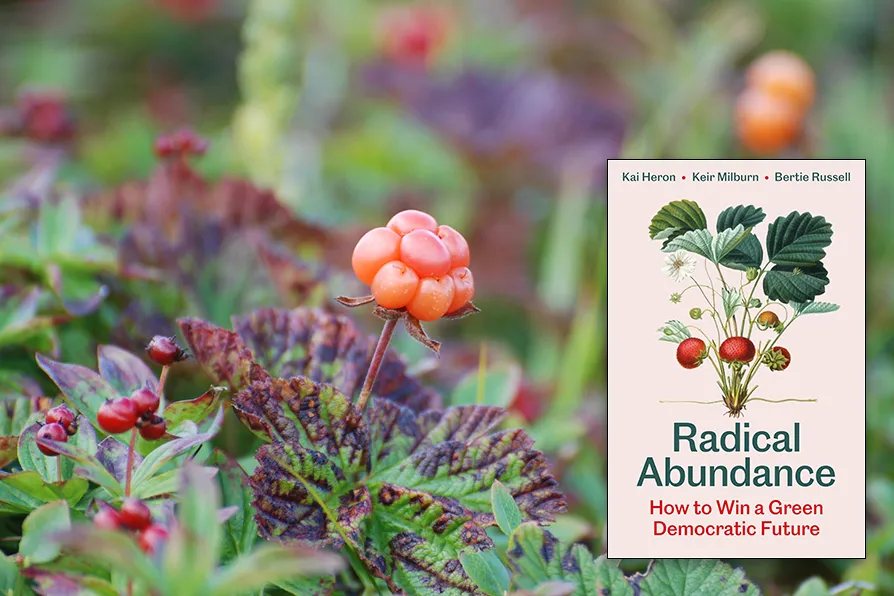GORDON PARSONS applauds a marvellous story of human ingenuity and youthful determination, well served by a large and talented company
JOE GILL wholeheartedly recommends an eloquent manifesto: how to change the world one local project at a time

 Wild cloudberries at Litloya, Nordland, Norway. [Pic: Littleisland lighthouse, Bjorn Tennoe]
Wild cloudberries at Litloya, Nordland, Norway. [Pic: Littleisland lighthouse, Bjorn Tennoe]
Radical Abundance: How to Win a Green Democratic Future
Kai Heron, Keir Milburn, Bertie Russell, Pluto Press, £16.99
CLOUDBERRIES sound like a magic fruit from the mind of Philip Pullman. They are a peachy pink fruit common across Scandinavia, northern Russia and Canada, eaten and cherished by indigenous peoples. However, you won’t find them in your local supermarket since the berries are too delicate and hard to harvest for commercial farming.
Cloudberries are luxuries under capitalism, but what if under a system of “communal luxury,” instead of relying on cheap seasonal labour, ordinary people had time to take part in growing and harvesting cloudberries and other nutritious fruits? This is a vision of biodiverse agriculture, and the expansion of free time for communal production that is envisioned in Radical Abundance.
“We will live in a world of bullshit abundance,” is the opening line of this powerful, urgent book — on what common ownership and socialised production could look like as we move beyond fossil fuel capitalism.
“Bullshit abundance” is the kind that produces an excess of the things we don’t need, such as SUVs, unaffordable housing, or highly processed food, while denying millions of working-class people access to the necessities of life, including a secure home, and free time to do meaningful, healthful things.
What does late capitalist scarcity look like? It’s not just unaffordable housing and stupidly expensive rail travel. It’s ecological collapse. A 73 per cent drop in wildlife populations in America since 1970, or an 81 percent drop in British song thrushes, leaving an eerie silence in the English countryside.
Under the rentier model of neoliberal capitalism, explain the authors, the site of production — the factory — is no longer the main source of surplus value for capital. Instead, urban development, housing and public services (in Marxist terms, social reproduction) are financialised to become the primary source of profit. Just look at Keir Starmer handing the country over to Larry Fink’s trillion-dollar asset manager Blackrock, privatised prisons, or the Covid VIP lane, and you get the idea.
The first half of the book is a thrilling theoretical ride through current thinking on capital and capitalism now. There’s an abundance of originality of thought here that gives the reader new perspectives on what is going on globally, and where popular resistance is taking place, from communes in Venezuela to housing projects in Berlin.
The writing is elegant, exciting and occasionally dense with concepts and real world examples, requiring full attention, but the rewards are huge.
The second half is a manifesto for how to change the world one local project at a time. These are not theoretical ideas, but based on the authors’ own experiences of attempting to build new forms of democratic worker- and community-led co-operatives, in Europe, the UK and the US. These include a housing project in Catalonia, and a public pharmaceutical factory in France. The chapter on the failures of big pharma to maintain production of essential generic drugs is eye opening.
A range of radical and Marxist thinkers are referenced, including Marx himself, Hungarian Marxist Istvan Mazaros, Stuart Hall, Marta Harnecker, Michael Leibowitz, and the Italian communist Amadeo Bordigo. The authors are not here to comfort the readers with familiar certainties, but rather to find fresh, explanatory tools to the existential issues we face, including ecological breakdown and finding a way out of capital’s iron grip on our lives.
Capital’s “metabolic control” is what confronts us and was, according to Mazaros, not overcome in the Soviet Union, because it did not succeed in replacing the alienated character of capital accumulation, with “surplus labour extracted in a political way,” in contrast to the economic extraction of surplus that takes place under capitalism.
Now we are in a post-neoliberal era, where the state enables asset owners and oligarchs to take over state services and infrastructure directly, relentlessly funnelling money upwards as wages and services decline.
In the face of what the authors helpfully call the derisking state — in which the state removes the risk in order for capital to profit from infrastructure or housing — they propose a different model, called public common partnerships (PCPs).
These are joint enterprises in which workers, communities and local authorities each have a stake in a development, whether it is a social housing project, a nonprofit pharmaceutical producer, or a council-owned farm. Crucially, surpluses produced by these enterprises are not dispersed to private shareholders but are used according to the democratic decisions of the common association, which is the third party in the enterprise, involving users, workers, and other stakeholders.
PCPs are the socialist antitheses of the public-private partnerships that have been the favoured way for states like the UK and US to enable capital to profit and acquire ownership of national investment projects.
These initiatives are not a quick solution to overthrowing capital, but they don’t require a socialist government to happen, although of course socialist authorities can and do support them. They can be created as a model that challenges the capitalist economy surrounding them, expanding and growing as a new model of economy within the old and dying one.
Heron, Milburn and Russell have offered a wager on a model of ownership that could be just what your local pharmacist, housing project or community farm needs. Take a look.









